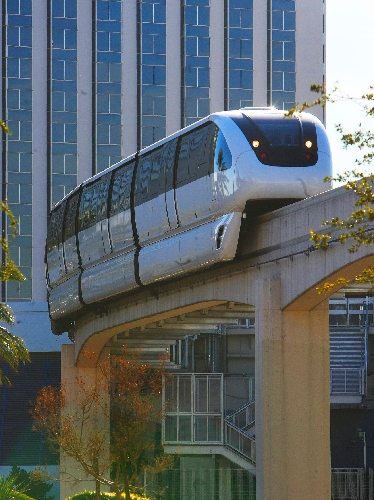Resolution puts Las Vegas Monorail on track to exit bankruptcy

A tentative resolution of a dispute between bondholders could clear many of the remaining hurdles to the Las Vegas Monorail exiting bankruptcy.
On Friday , the parties in the case will request U.S. Bankruptcy Court clearance to ask a Minnesota state court to approve a deal under which second-tier bondholders will pay $400,000 from a reserve fund to first-tier bondholders, ending a complex legal fight that has tied up the monorail case for months. All other claims the two had made on each other’s money will be dropped.
The first-tier bonds get that designation because they take precedence for repayment. The monorail is worth far less than the $500.2 million owed on the first-tier bonds, so the $158.7 million second-tier will be completely wiped out.
However, the first-tier bonds were protected by insurance from Ambac Assurance Corp. to cover payments if the monorail defaulted. When Ambac itself wound up in receivership it triggered litigation in Minnesota, home of second-tier bond trustee U.S. Bank, over what was left.
A third set of uninsured bonds totaling $49.5 million is also worthless. The money from all the bonds was used 11 years ago to buy the original monorail, which ran between MGM Grand and Bally’s, and then extend it north to the Sahara.
If U.S. Bankruptcy Court Judge Bruce Markell OKs the bond deal, monorail attorney Gerald Gordon wrote in court papers filed Sept. 2, “the hearing to approve the (monorail reorganization) plan will be simplified, taking less time from the court and counsel.”
That reorganization hearing is also slated for Friday. If the plan is approved, it would largely end the Chapter 11 case that began in January 2010, when bondholders took over revenues from ticket sales and dispensed what they thought was needed to keep operations going.
The monorail and the first-tier bond holders have not yet settled all their differences, said Susan Freeman, an attorney for Wells Fargo Bank, which serves as the trustee for the bondholders. She declined to specify what points remain, except to say they are in negotiation.
In the past, the bondholders have complained about the terms they were offered, namely $44.5 million in three separate IOUs, or less then 10 percent of what they are owed. Freeman raised concerns in previous court papers that at least some of the new loans would turn out to be worthless.
However, the bondholders have also backed off previous threats to put in their own reorganization plan, which could have led to them to take over the monorail and oust the nonprofit corporation and current management.
Even if all the legal issues are finessed away, the monorail still faces major hurdles in its attempt to keep running on its 3.9-mile course just east of the Strip. By the end of the decade, it faces major equipment overhaul and replacement bills for which it currently does not have the money. Also, it will need fresh financing to reach its goal of extending to McCarran International Airport, in the hope of reversing several years of declining ridership and revenues.
Contact reporter Tim O’Reiley at
toreiley@reviewjournal.com or 702-387-5290.